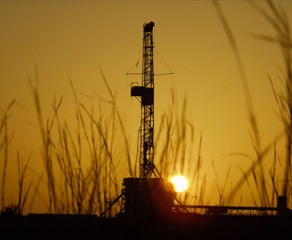Shale boom at risk over environment concerns
By JAMES HERRON
LONDON -- Global exploitation of shale gas reserves could transform the world's energy supply by lowering prices, improving security and even curbing forecast carbon dioxide emissions, but the industry might be stopped in its tracks if it doesn't work harder to resolve concerns over its environmental safety, the International Energy Agency (IEA) said Tuesday.
The IEA's report shows how the shale gas industry, which has already dramatically altered the energy landscape in the US, stands at a tipping point that will determine how it spreads across the rest of the world.
"If the social and environmental impacts aren't addressed properly, there is a very real possibility that public opposition...will halt the unconventional gas revolution in its tracks," resulting in the loss of an historic opportunity to provide cheaper and more secure energy to the some of the world's largest consumers, said IEA executive director Maria van der Hoeven at a press briefing.
However, if the industry follows a set of "golden rules" recommended by the IEA it can win public support, allowing natural gas to become the fastest growing energy source over the next two decades, the IEA said.
For companies involved in the industry, this is an, "immediate issue...that could have global implications," said Fatih Birol, the IEA's chief economist, in an interview with Dow Jones Newswires.
 Shale gas has only become a major energy source in recent years, as a process called hydraulic fracturing that releases the gas from the impermeable rock in which it is trapped has entered widespread use. It has already produced a boom in natural gas production in the US, driving prices to 10-year lows, but is only beginning to spread elsewhere.
Shale gas has only become a major energy source in recent years, as a process called hydraulic fracturing that releases the gas from the impermeable rock in which it is trapped has entered widespread use. It has already produced a boom in natural gas production in the US, driving prices to 10-year lows, but is only beginning to spread elsewhere.
The industry's nascent international expansion has already attracted a significant level of opposition, notably in Europe, from groups concerned about the risks of water contamination, earth tremors or the release of greenhouse gases.
Hydraulic fracturing has been banned in France and Bulgaria and temporarily halted in the UK.
Opponents of shale gas drilling have legitimate concerns, but all of them can be dealt with adequately with existing technology and best practice, said Birol.
The IEA's golden rules would only add around 7% to operating costs, he said.
These include carefully choosing drilling sites to avoid earth tremors, using the highest standards of well design to avoid groundwater contamination, properly disposing of waste water and eliminating all emissions of polluting gases from the well head, the IEA said.
Environmental group Greenpeace, which opposes all exploitation of unconventional gas reserves, criticized the IEA for not proposing specific procedures for preventing many of these environmental hazards, particularly the venting of the potent greenhouse gas methane from wellheads.
One past critic of the shale gas industry's methane emissions - Craig Mackenzie, head of sustainability at the GBP142 billion asset manager Scottish Widows Investment Partnership - said the IEA's rules would make a big difference if widely adopted.
"The whole industry hasn't yet got behind this agenda," he told reporters in London, but some companies such as Royal Dutch Shell have already adopted best practice similar to the IEA's new rules and are implementing them in China, which has the potential to be a major shale gas producer.
If the shale gas industry follows its blueprint, the IEA said that between 2010 and 2035 natural gas could be by far the fastest growing fuel, with consumption increasing by 50% to overtake coal as the world's second largest source of energy.
Countries that were net importers of natural gas in 2010 are likely to be the biggest winners, as they increase domestic energy production and reduce the power of major exporting regions like Russia and the Middle East, the IEA said.
Natural gas prices would be around 30% lower in most major markets than they would otherwise have been, reducing the import bills of major consumers like the European Union and China by tens of billions of dollars, it said.
None of these gains will occur if the lack of public acceptance stifles the industry at this early stage, the IEA said. In this scenario, global emissions of carbon dioxide would actually be 1.3% higher, because carbon-heavy coal would make up a greater share of global energy supplies.
The IEA's Birol said that despite the benefits of switching from coal to gas, energy efficiency, renewable energy and carbon capture and storage are still needed to prevent dangerous climate change.
Dow Jones Newswires






Comments